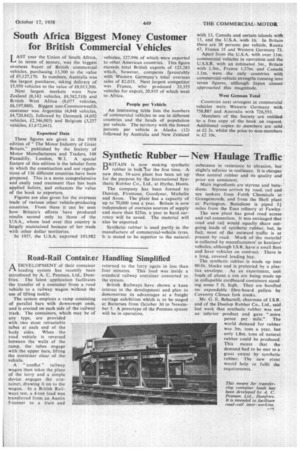Synthetic Rubber — New Haulage Traffic
Page 79

If you've noticed an error in this article please click here to report it so we can fix it.
DRITAIN is now making. synthetic rubber in bulkefor the first time. A new £6m. 54-acre plant has been set up for the purpose by the International Synthetic Rubber Co., Ltd., at Hythe, Hants.
The company has been formed by Dunlop, Firestone, Goodyear, Michelin and Avon. The plant has a capacity of up to 70,000 tons a year. Britain is now independent of overseas sources of supply and more than $25m. a year in hard currency will be saved. The material will also be exported. • Synthetic rubber is used partly in the manufacture of commercial-vehicle tyres. It is stated to be superior to the natural substance in resistance to abrasion, but slightly inferior in resilience. It is cheaper than natural rubber and its quality and price are consistent.
Main ingredients are styrene and butadiene. Styrene arrive 's by road, rail and sea tankers from Forth Chemicals at . Grangemouth, and from the Shell plant at Partington. Butadiene is piped 11 miles from the Esso refinery at Fawley. '
The new plant has good road access and rail connection. It was envisaged that road and rail would equally share outgoing loads of synthetic rubber, but, in fact, most of the outward traffic is at present by road. Much of the material is collected by manufacturers' or hauliers' vehicles, although I.S.R. have a small fleet and have vehicles on contract. There is a long, covered loading bay.
The synthetic rubber is made up into 80-lb. blocks and is protected by a plastics envelope. As an experiment, unit loads of about a ten are being made up in collapsible cardboard containers standing some 5 ft. high. They are handled • on expendable fibre-board pallets by Coventry Climax fork trucks.
Mr. G. E. Beharrell, chairman of I.S.R. and of the Dunlop Rubber Co., Ltd., said last week that synthetic rubber was not an inferior product and gave "more pence per mile." The world demand for rubber was 3m. tons a year, but only 1.8m. tons of natural rubber could be produced. This meant that the demand had to be met to a great extent by synthetic rubber. The new plant would help to fulfil the requirements.




















































































































